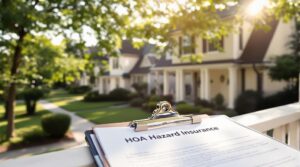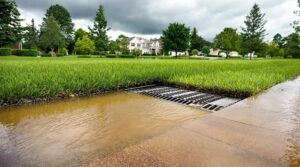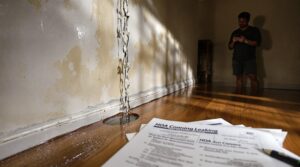HOA insurance and homeowners insurance serve distinct purposes in residential property protection. HOA policies cover shared spaces, exterior structures, and common areas, while homeowners insurance protects individual units, personal belongings, and liability. Property owners in HOA communities typically need both types of coverage to guarantee thorough protection. The coordination between these policies becomes vital for avoiding coverage gaps and maximizing claim settlements. Understanding the nuances of each policy type reveals essential strategies for peak protection.
Key Takeaways
- HOA insurance covers communal areas and shared spaces, while homeowners insurance protects personal property and individual living spaces.
- HOA policies typically cover exterior walls in condos, while homeowners insurance focuses on interior damage and personal belongings.
- Homeowners insurance provides liability protection for incidents within your unit, whereas HOA insurance covers accidents in common areas.
- HOA insurance is paid through mandatory association fees, while homeowners insurance requires individual premium payments.
- Both types of insurance are necessary for complete protection in HOA communities, working together to eliminate coverage gaps.
Understanding HOA Insurance Coverage Areas
When property owners join a homeowners association, they gain access to an extensive insurance policy that safeguards shared spaces and common elements of the community.
The HOA insurance policy primarily focuses on liability protection for accidents or injuries occurring in communal areas, protecting the association from potential legal claims.
The master policy may cover property damage to shared spaces such as clubhouses, swimming pools, and landscaping against perils like fire and vandalism.
For condominium communities, coverage extends to exterior walls, but significantly excludes personal property and unit interiors.
Understanding coverage limits is essential, as HOA insurance typically does not protect against specific perils like floods or earthquakes.
Residents should recognize that while their monthly dues fund this thorough coverage, additional insurance may be necessary to protect their individual interests.
The distinction between homeowners insurance and HOA coverage is vital for maintaining complete protection of both shared and private property.
Key Components of Homeowners Insurance Protection

Unlike HOA insurance, a detailed homeowners insurance policy encompasses multiple important components designed to protect individual property owners from financial losses. While the HOA master policy covers common areas, individual home insurance policy safeguards personal property and provides extensive protection.
| Coverage Component | Protection Provided |
|---|---|
| Dwelling Coverage | Insurance covers your property structure against fire, theft, water damage |
| Personal Belongings | Protects contents, valuables, and belongings inside the home |
| Liability Protection | Covers bodily injury or property damage to third parties |
| Additional Coverage | Optional riders for specific valuable items or risks |
Understanding coverage levels is vital for maximizing financial protection. Homeowners can choose between actual cash value, replacement cost, or guaranteed replacement cost options. While standard policies protect against most perils, they typically exclude flood damage, requiring separate coverage. The extensive nature of homeowners insurance guarantees protection beyond the limitations of HOA coverage, providing essential safeguards for both property and liability risks.
Where HOA and Homeowners Insurance Meet
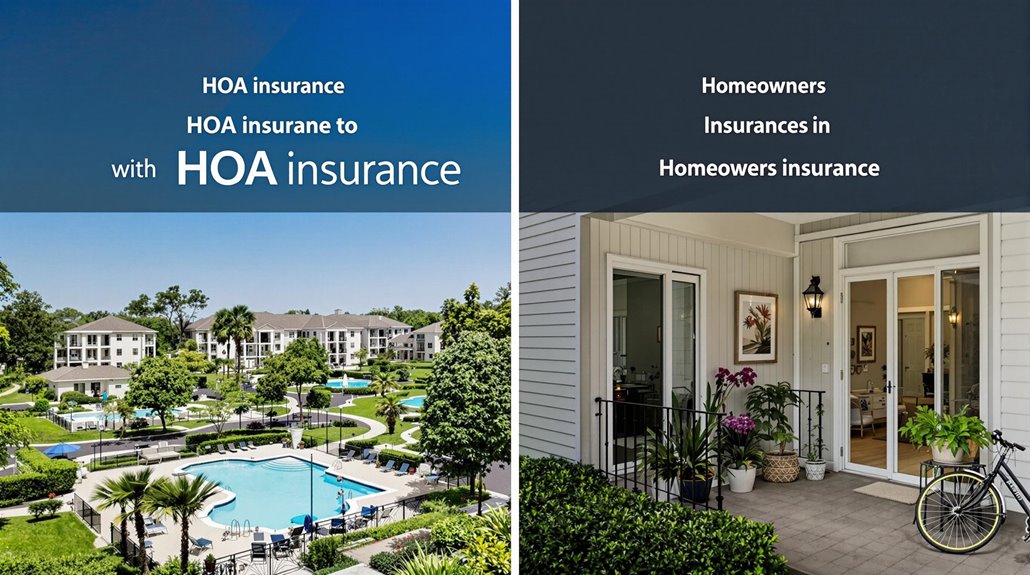
The intersection of HOA and homeowners insurance creates a thorough shield of protection for property owners in managed communities.
HOA insurance typically focuses on communal property and liability for injuries in shared spaces, while personal condo insurance safeguards individual units and belongings.
The condo master policy works in conjunction with individual homeowners insurance policies to guarantee extensive coverage.
When damage or liability claims exceed the HOA’s insurance limits, loss assessment coverage helps protect homeowners from substantial financial burden.
This dual-layer protection system requires careful coordination between policies to eliminate coverage gaps.
Property owners must understand their responsibilities under both insurance frameworks.
While the HOA maintains coverage for common areas, residents need their own policies for personal property and unit-specific incidents.
Regular review of both policies guarantees homeowners maintain adequate protection and understand where each type of coverage applies in various claim scenarios.
Essential Differences in Coverage and Costs

Thorough understanding of HOA and homeowners insurance reveals fundamental differences in both coverage scope and cost structures.
While a homeowners insurance policy provides extensive protection for personal property, structural damage, and individual liability issues, HOA insurance specifically addresses shared amenities and common areas within the association’s jurisdiction.
Cost considerations vary greatly between these insurance types. Homeowners insurance typically requires annual premiums ranging from $1,300 to $1,700, protecting against covered perils such as fire and theft.
In contrast, HOA insurance is funded through mandatory HOA fees, averaging $191 monthly in 2021, which also cover maintenance and administrative expenses.
The scope of insurance coverage differs markedly: homeowners policies protect individual condo or home contents and provide personal liability protection, while HOA insurance focuses exclusively on property damage and liability issues in communal spaces.
This distinction necessitates maintaining both types of coverage in HOA-governed communities to guarantee complete protection.
Making Smart Insurance Choices for Your Property
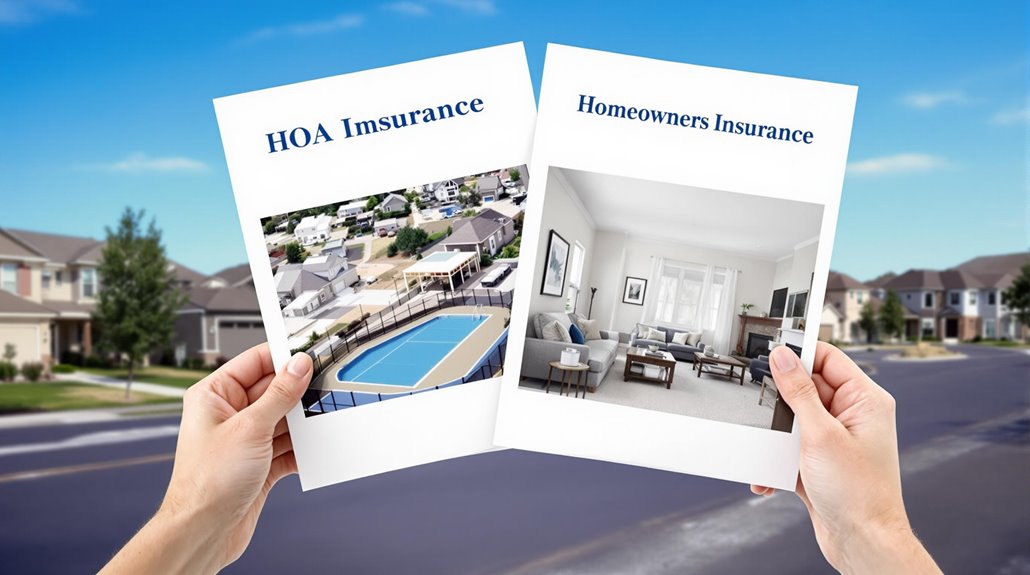
Strategic selection of property insurance requires careful examination of both HOA and homeowners coverage to guarantee complete protection against potential risks.
Property owners must analyze their HOA insurance policy to identify coverage limitations for shared community spaces and determine necessary supplemental protection through individual homeowners insurance policies.
To make informed insurance choices, residents should focus on addressing potential insurance gaps between HOA and personal coverage.
A thorough homeowners insurance policy should provide adequate liability coverage and protection for personal property not covered under the HOA policy.
Smart risk management involves evaluating coverage limits for both types of insurance and securing additional coverage when needed.
Property owners should consider consulting insurance professionals to evaluate their specific needs, ensuring their combined HOA and homeowners insurance policies provide full protection.
This approach helps prevent financial exposure while maintaining appropriate coverage levels for both individual units and community assets.
The Benefits Of Consulting A Public Adjuster

Public adjusters offer specialized expertise in maximizing insurance claim settlements through objective damage assessments and thorough documentation of losses.
Their professional guidance streamlines the complex claims process while eliminating potential errors that could reduce settlement amounts.
Studies indicate that policyholders who engage public adjusters typically receive considerably higher claim payouts, often achieving settlements up to 800% greater than those handling claims independently.
Expertise In Insurance Claims
Insurance claim settlements can increase by up to 30% when policyholders engage the services of a professional public adjuster. These specialists possess in-depth knowledge of both standard homeowners insurance policy and HOA master insurance policy requirements, enabling them to maximize claims effectively.
Their expertise helps navigate complex insurance claims, ensuring complete coverage for property damage or liability issues that arise.
Public adjusters meticulously document damage due to covered perils, providing detailed assessments that insurance companies cannot easily dispute.
For homeowners associations and individual property owners, claims handled by public adjusters typically result in higher settlements due to their thorough understanding of policy coverage and claims procedures.
Their professional expertise proves invaluable when interpreting complex policy language and ensuring all eligible damages are properly documented and compensated.
Objective Damage Assessment
When property damage occurs, obtaining an objective assessment becomes a critical factor in securing appropriate compensation. A public adjuster provides professional expertise in evaluating damage caused to both external structure and interior components, ensuring detailed documentation of repair costs for insurance claims.
For homeowners association (HOA) members, understanding how insurance works and what your policy will cover can be complex. Public adjusters specialize in identifying damages that may be overlooked during initial assessments, particularly in cases where coverage your HOA provides intersects with individual homeowner policies.
Their unbiased evaluation methods help establish accurate claim values, often discovering additional compensable damages that property owners might miss. This professional approach to damage assessment typically results in more thorough claims documentation and improved settlement outcomes.
Streamlined Claim Process
How effectively homeowners navigate the complex insurance claims process can profoundly impact their settlement outcomes.
Within an hoa community, engaging a public adjuster can greatly streamline negotiations with the insurance company, particularly when dealing with damage to shared property. These professionals specialize in interpreting insurance policies and documenting property damage in detail.
Public adjusters serve as advocates for the homeowners association (HOA) and individual residents, often securing settlements 20-50% higher than self-managed claims.
While they charge a percentage-based fee, their expertise frequently justifies the investment by maximizing claim values and minimizing the risk of legal action.
Their thorough understanding of coverage terms guarantees all legitimate damages are properly documented and claimed, reducing the likelihood of overlooked compensation opportunities within the claims process.
Higher Claim Payouts & Settlements
Public adjusters consistently demonstrate their value through superior claim settlement outcomes for homeowners and HOAs alike.
Statistical evidence reveals that policyholders who engage these licensed professionals typically secure 20-50% higher claim payouts compared to those managing claims independently. Their expertise in both homeowners insurance and HOA insurance policies enables thorough coverage identification and extensive assessment of property damage.
These professionals strengthen insurance claims through detailed documentation and skilled negotiation with insurers.
Their specialized knowledge helps identify coverage opportunities that property owners might otherwise miss. By managing complex claim processes and providing expert representation, public adjusters maximize settlements while reducing the burden on policyholders.
This professional advocacy guarantees that both homeowners and HOAs receive fair compensation for their losses, justifying their role in the claims process.
About The Public Claims Adjusters Network (PCAN)

The Public Claims Adjusters Network (PCAN) stands as a nationwide alliance of elite, state-licensed public adjusters who undergo rigorous vetting and maintain strict professional standards. This network serves as a critical resource for policyholders seeking expert assistance with property damage insurance claims, including those related to homeowners association coverage disputes.
- Pre-vetted adjusters covering 40+ states and 30+ claim types
- Mandatory annual audits of licenses and complaint records
- Intensive application and interview process for membership
- Specialized expertise in both residential and commercial claims
PCAN maintains its position as an industry leader by connecting qualified policyholders with top-tier public adjusters who have demonstrated exceptional proficiency in claims handling.
The network’s commitment to excellence guarantees that only the most competent and ethical professionals are admitted, providing property owners with access to verified experts who can effectively navigate complex insurance claims processes.
Frequently Asked Questions
Is Homeowners Insurance the Same as HOA?
Like separate branches of a tree, HOA and homeowners insurance serve distinct purposes: HOA coverage protects common areas and shared spaces, while homeowners policies safeguard individual properties, personal belongings, and liability risks.
What Is the 80% Rule in Homeowners Insurance?
The 80% rule requires homeowners to insure their property for at least 80% of replacement cost value to receive full claim benefits, otherwise insurance payouts may be reduced proportionally during claims processing.
What Insurance Do HOA Fees Cover?
HOA fees fund master insurance policies covering common area maintenance, liability coverage for shared spaces, and property damage to communal structures, while excluding individual unit coverage that homeowners must secure separately.
What Are the Two Main Types of Homeowners Insurance?
The two main types of homeowners insurance are Actual Cash Value (ACV) policies, covering replacement minus depreciation, and Replacement Cost policies, providing full coverage without depreciation for dwelling and personal property protection.
